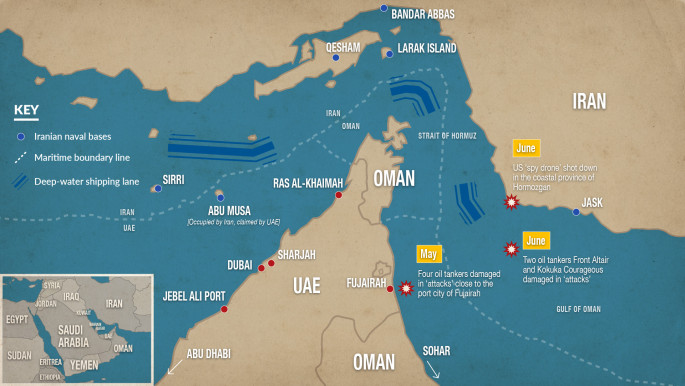Breadcrumb
US cyberstrike hurt Iran's ability to target oil tankers, officials say
US intelligence officials said that a cyberstrike in June has temporarily blocked Iran from perpetrating sabotage attacks against oil tankers in the Gulf.
3 min read
Several oil tankers were hit by mine attacks in May and June [Getty]
The United States launched a cyberattack against Iran in June, disabling a database used to target oil tankers in the Gulf, the New York Times reported on Wednesday.
According to US officials, Iran is still trying to retrieve information destroyed in the 20 June attack on the network used by Iran's Revolutionary Guards, with some of the computer systems still offline.
Senior officials told the New York Times that the attack had degraded Iran's abilities to covertly target ship traffic in the Strait of Harmuz, a vital and heavily trafficked shipping route that has seen multiple attacks on oil tankers in the past months.
According to US officials, Iran is still trying to retrieve information destroyed in the 20 June attack on the network used by Iran's Revolutionary Guards, with some of the computer systems still offline.
Senior officials told the New York Times that the attack had degraded Iran's abilities to covertly target ship traffic in the Strait of Harmuz, a vital and heavily trafficked shipping route that has seen multiple attacks on oil tankers in the past months.
Relations between the US and Iran have quickly deteriorated since President Donald Trump withdrew from the Iran nuclear deal in 2017.
Tensions have soared over the past few months, with a series of sabotage attacks on tankers in the Gulf and oil installations in Saudi Arabia blamed on Iran by the kingdom and its US ally.
Tensions strained further when the UK seized an Iranian oil tanker off the coast of Gibraltar in July, accusing the ship of planning to ferry oil to Syria in contravention of European Union sanctions.
 |
The incident sparked a major diplomatic row and several more seizures of internationally flagged tankers in the Strait of Hormuz by the Revolutionary Guards.
Officials said the 20 June cyberstrike was part of an ongoing, unofficial cyber war between Iran and the US, which has pledged to exert "maximum pressure" on the Islamic republic since President Donald Trump took power.
US cyberstrikes are designed to alter Iranian behaviour without provoking a broader physical conflict or retaliation, Norman Roule, a former senior intelligence official, said.
Such attacks are essentially covert operations as they are rarely acknowledged publicly.
Although cyberattacks do not always deter future aggressions as they are difficult to attribute and not always publicly acknowledged on either side, the US hopes to show strength through such unconventional warfare, officials say.
"You need to ensure your adversary understands one message: The United States has enormous capabilities which they can never hope to match, and it would be best for all concerned if they simply stopped their offending actions," Roule said.
While other governments did not accuse Iran of the sabotage attacks on tanker in the Gulf in May and June, the US obtained intelligence indicating the Revolutionary Guards were behind the limpet mine attacks.
The cyberattack came in response to that and the downing of a US spy drone by Iran in June.
"You need to ensure your adversary understands one message: The United States has enormous capabilities which they can never hope to match, and it would be best for all concerned if they simply stopped their offending actions," Roule said.
While other governments did not accuse Iran of the sabotage attacks on tanker in the Gulf in May and June, the US obtained intelligence indicating the Revolutionary Guards were behind the limpet mine attacks.
The cyberattack came in response to that and the downing of a US spy drone by Iran in June.
The drone downing prompted Trump to order a strike on Iran. When the president backed down on that attack, the White House judged that the cyberstrike would act as a proportional response to Iranian actions.
According to officials, the attack has limited Iran's ability to perpetrate similar sabotage attacks to the ones in May and June.
However, when the vulnerability that allowed US cyber operatives to gain access to the Revolutionary Guards database is patched, the US will also lose access to vital intelligence on Iran.
According to officials, the attack has limited Iran's ability to perpetrate similar sabotage attacks to the ones in May and June.
However, when the vulnerability that allowed US cyber operatives to gain access to the Revolutionary Guards database is patched, the US will also lose access to vital intelligence on Iran.
For that reason, some officials are skeptical of the benefits of cyberattacks.
Saudi Deputy Defence Minister Prince Khalid bin Salman met with US Secretary of State Mike Pompeo on Wednesday to discuss the Iran crisis.
Saudi Deputy Defence Minister Prince Khalid bin Salman met with US Secretary of State Mike Pompeo on Wednesday to discuss the Iran crisis.
The State Department said on Wednesday that the Saudi defence official and the Secretary of State discussed "stronger maritime security" in the Gulf.
The US has been seeking to form a coalition to guarantee freedom of navigation in the Gulf.
Britain, which already has warships on protection duty in the Gulf after a UK-flagged tanker was seized by the Revolutionary Guards, has said it will join the planned operation.
But other European countries have declined to join, for fear of harming European efforts to rescue a 2015 treaty with Iran over its nuclear programme.
![Oil Tanker mine [Getty] Oil Tanker mine [Getty]](/sites/default/files/styles/image_345x195/public/media/images/EC161CE2-489E-4D6F-BB87-9014AB636ED1.jpg?h=d1cb525d&itok=SrpucCyH)





![Anthony Blinken speech [Getty] Anthony Blinken speech [Getty]](/sites/default/files/styles/image_684x385/public/media/images/6263436E-8ACD-4D3C-9055-25A7BE79DD5A.jpg?h=d1cb525d&itok=fLHmHCRG)
 Follow the Middle East's top stories in English at The New Arab on Google News
Follow the Middle East's top stories in English at The New Arab on Google News


![MSF halts operations on one of Sudan's last functioning hospitals [Getty]](/sites/default/files/styles/image_330x185/public/2177142919.jpeg?h=a5f2f23a&itok=vnjc3phC)